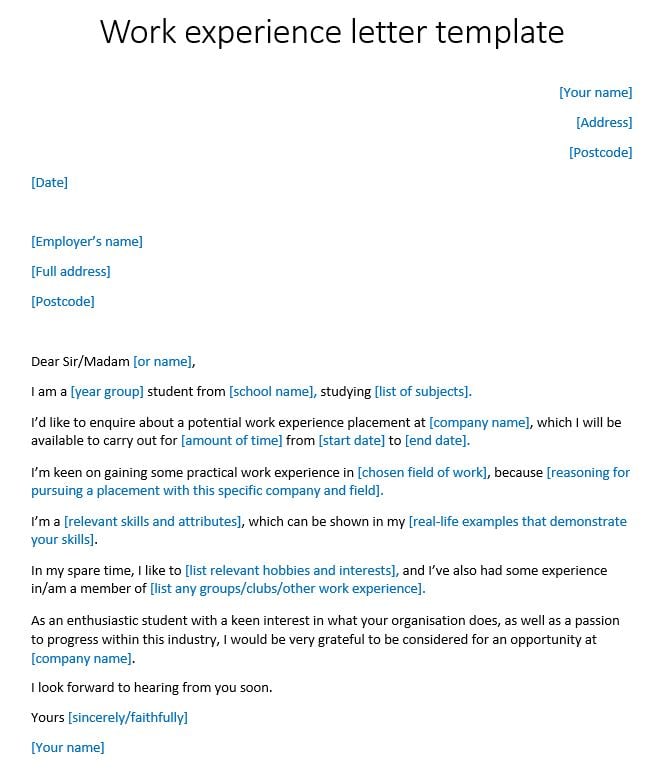

No matter what your situation, a well-written work experience letter could make all the difference when it comes to being considered for your ideal placement, not to mention help you to stand out from a number of other applicants.
But how do you ask for it, and what do you need to include?
We’ve already covered what you need to know about work experience placements, but here’s our free work experience letter template, to help you get started:

Work Experience Letter Template
By clicking Submit, you accept our Terms & Conditions and consent to receive emails and career related topics. See our Privacy policy for details. Continue without submitting
A work experience letter is something you attach on your application for work experience, to let a company know you’re interested in finding a placement with them.
It’s similar to a cover letter, although it will tend to focus more on your skills and education, rather than your previous experience (although it is possible to find work experience later on in your career).
Although your work experience letter will always be unique to you and your situation, you should generally try to include the following:
If you’re further along in your career, you may also want to include a copy of your CV.
Internship and apprenticeship applications work slightly differently, so if you’re interested in these opportunities, our internship and apprenticeship section should help get started.
Cover: Who are you, and what are you looking for?
In other words, covering the basics.
This section should be short, to the point, and most importantly – accurate.
Always double-check to make sure you’ve got the right address and name, and don’t forget to edit it for each organisation you send your letter to. Because (unsurprisingly), work experience letters addressed to the wrong person won’t impress any employer.
And, as work experience placements are rarely formally advertised, it’ll be up to you to make your own offer. So also give the employer a brief outline of who you are, what you’re doing (e.g. at school, university, or working), and explain what you’re looking for.
Example: I am a Year 10 student from Secondary School, studying GCSEs in Maths, English, and Science, alongside my chosen subjects of Textiles, Graphics, Geography, and Art.
I’d like to enquire about a potential work experience placement at Company Name LTD which I will be available to carry out for two weeks, from Date X-Date Y.
Cover: What are your career goals?
This section should express a genuine interest for your chosen company and field of work, which should coincide with your career goals and ambitions.
And, as it’s likely that many local organisations receive a large number of work experience requests, you’ll need to place emphasis on your enthusiasm if you want to land your perfect placement.
To really stand out, show you’ve done your research, and express an interest in the company’s recent developments and successes.
Whether the organisation has recently launched a marketing campaign you support, you’re a big fan of their products or services, or you have a keen interest in the brand and what they stand for – expressing why you want to work for a particular organisation will help boost your chances of being considered.
Example: I’m keen on gaining some practical experience in a creative environment, as this is the field I’m looking to pursue a career in in the future. I’m particularly interested in working for Fashion Retail Company LTD – being an avid fan of your products (having used many of them myself). I also feel you provide excellent service and the atmosphere is positive and welcoming whenever I visit the store.
Cover: Why are you suitable for the placement?
This is your chance to sell yourself.
List all of your relevant skills, and think of a real-life example to back each of them up. The examples can be from any area of your life (work, school, university), but it’s important that they accurately quantify your skills.
Then, consider your hobbies and interests, and assess what value they could add to your application. Are they related to the placement? Do they demonstrate any of the above skills? And are they unique enough to gain a positive reaction?
Example: I’m a motivated hard worker, with a creative mind and an excellent attention to detail. This can be shown in my most recent assignments for Textiles and Graphics, where I used both creativity and attention to functionality to create an children’s dress and an interactive board game – achieving an A* for each.
In my spare time, I volunteer at a local dance group, where I help to look after 10 children alongside a qualified dance teacher. This demonstrates my leadership skills, and ability to work well with others.
Cover: Everything again (AKA Reiterate)
Close the letter by summing up your suitability and interest in the field, and always express your gratitude for their consideration.
After all, an employer isn’t obligated to give anyone a work experience placement. You may be helping them out by offering to work, but they’re doing you a favour too – especially if gaining experience in the field you’re looking for work in will help with your overall career goals.
Keep this section short (one or two lines max), and abide by the standard letter rules when you sign off (yours sincerely if you know their name, yours faithfully if you don’t).
Example: As an enthusiastic student with a keen interest in what your organisation does, alongside an ability to learn new things and progress in this industry, I would be very grateful to be considered for an opportunity at Retail Fashion Company LTD.
I look forward to hearing from you soon.